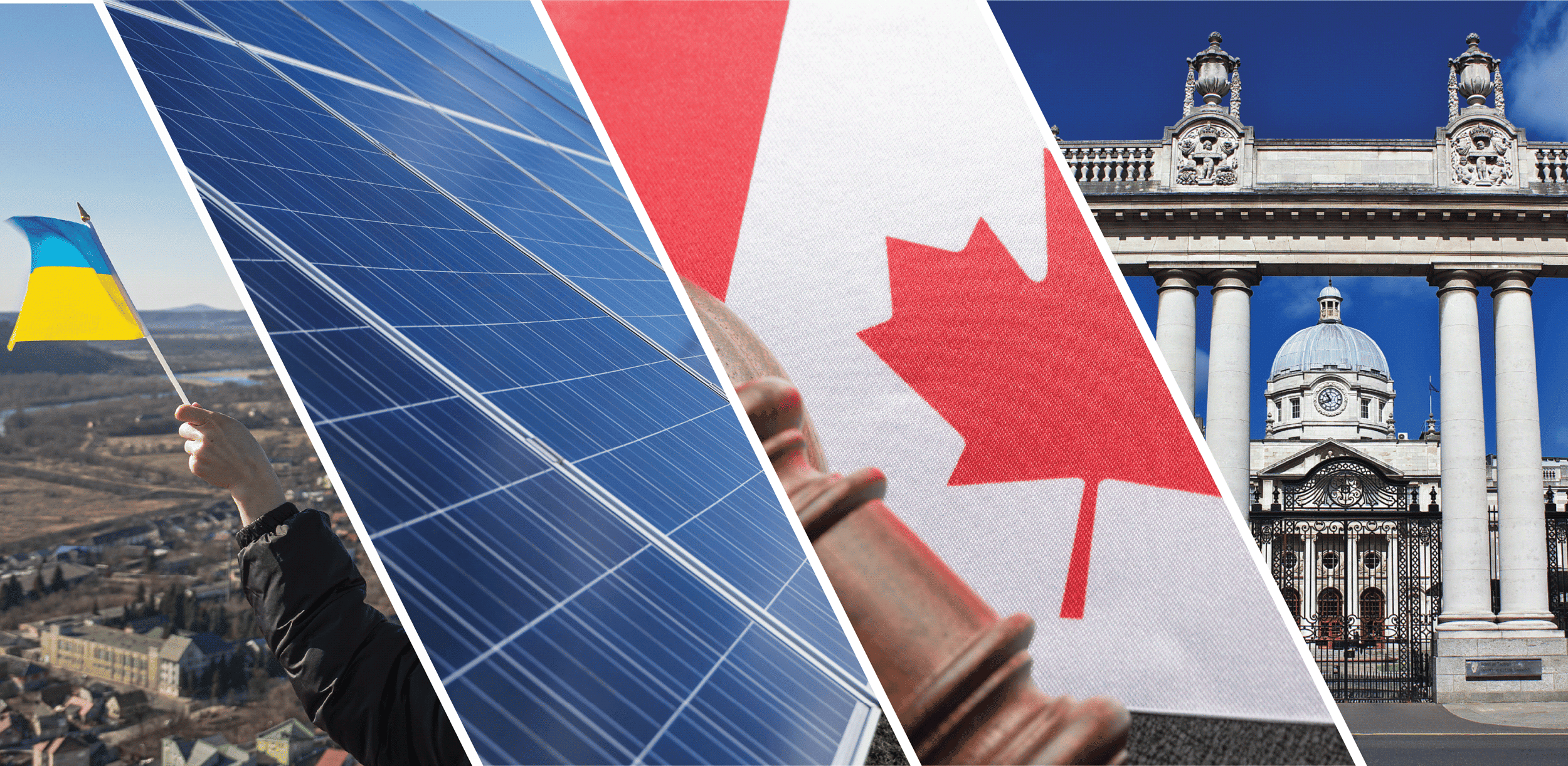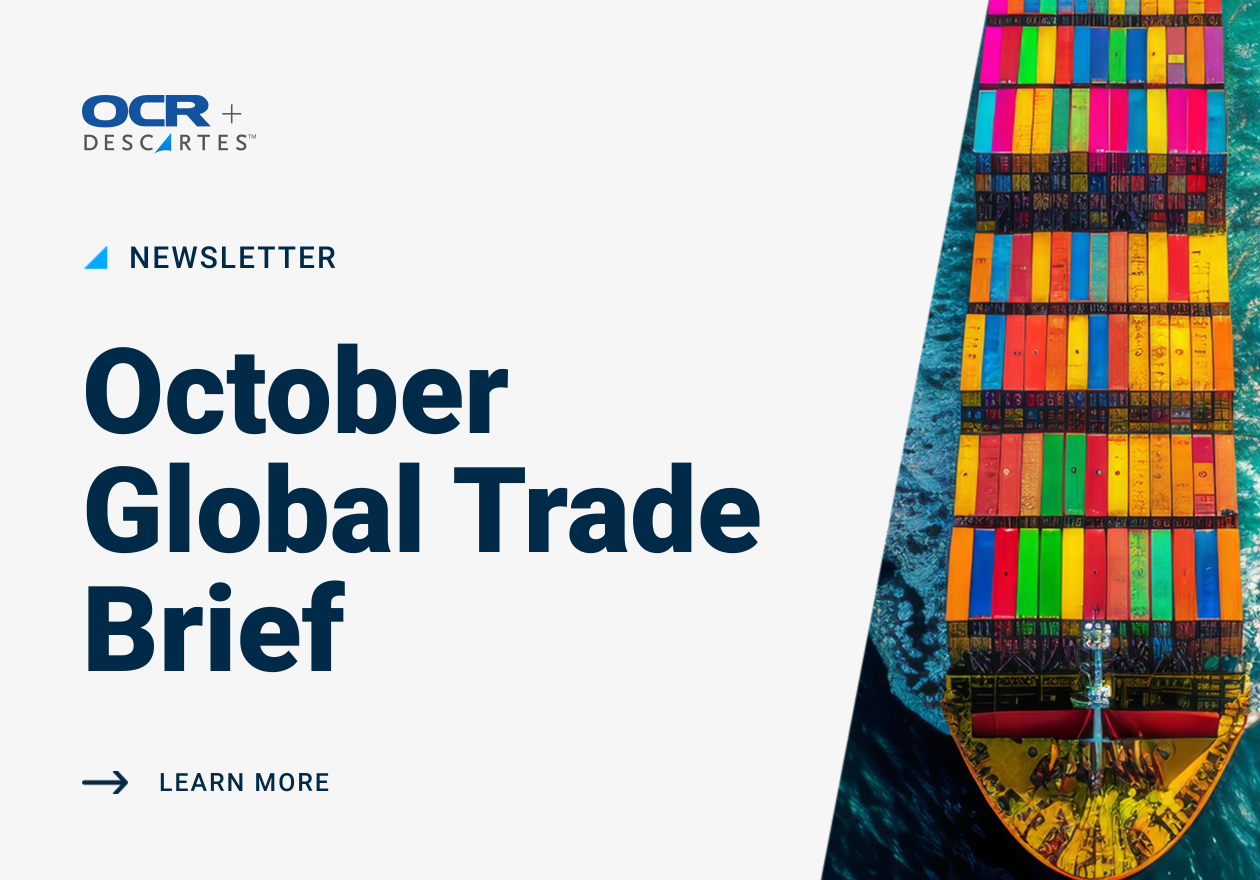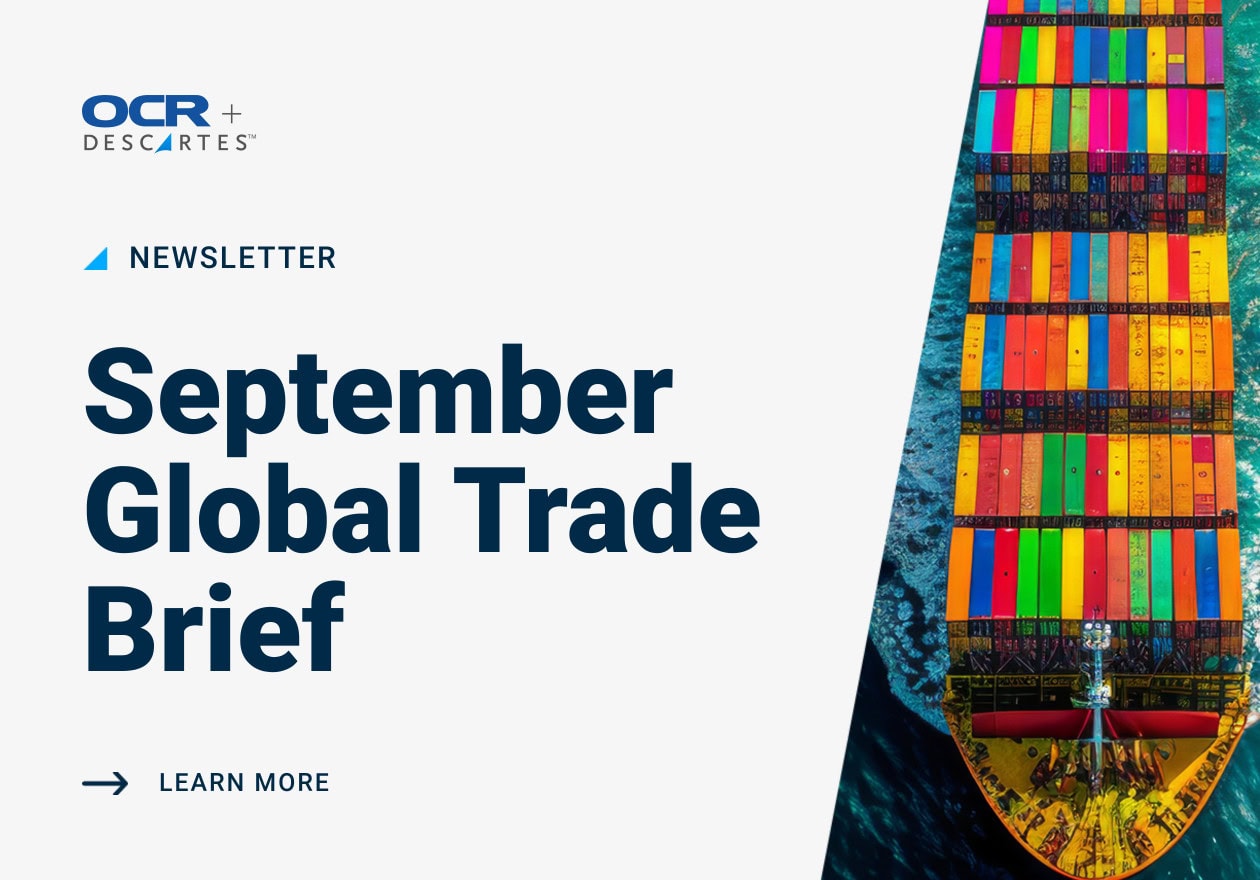EU: Waiver of customs duties and VAT on import of “life-saving goods” to Ukraine
The European Commission has adopted a Decision enabling Member States to temporarily waive customs duties and VAT on the importation from third countries of food, blankets, tents, electric generators, and other life-saving equipment destined for Ukrainians affected by the war. This measure, which was requested by Member States, will apply retroactively from 24 February
The duty and VAT waiver applies to goods imported by:
- State organizations (public bodies and bodies governed by public law including hospitals, governmental organizations, regional governments, communes/towns, etc.)
- Charitable or philanthropic organizations approved by the competent authorities of the Member States.
Source: https://ec.europa.eu/commission/presscorner/detail/en/ip_22_4235
Memorandum of understanding” between United States and Canada to resolve dispute on trade in solar products
The United States and Canada announced a memorandum of understanding (MOU) to settle a dispute on trade in solar products under the United States-Mexico-Canada Agreement (USMCA). The MOU promotes greater North American solar supply integration and reaffirms both countries’ commitment to prohibit imports of solar products produced in whole or in part with forced or compulsory labor. The MOU also contains a mechanism to ensure that solar product imports from Canada do not undermine the existing U.S. safeguard measure on imports of solar products. Ambassador Katherine Tai and Minister Mary Ng will sign the MOU on July 8, 2022.
In early 2018, the United States imposed the solar safeguard measure to support the domestic solar industry’s efforts to adjust to import competition primarily attributable to excess solar cell and module capacity by Chinese producers in China and around the world and exacerbated by China’s non-market practices. The safeguard measure was established after the U.S. International Trade Commission (USITC) found that the domestic solar industry was seriously injured by increased imports.
On February 4, 2022, President Biden extended the solar safeguard measure for an additional four years and directed the United States Trade Representative to conclude agreements with Canada and Mexico on trade in solar products. On February 15, 2022, a USMCA panel issued its report, finding that the prior Administration’s decision to include imports from Canada in the solar safeguard measure was inconsistent with certain USMCA rules. The MOU with Canada also constitutes a resolution of this outstanding dispute
Implementation of sanctions: Commission provides additional guidance on the transit of goods from Russia
The European Commission has today published further guidance to Member States on the transit of goods from Russia. This is part of regular technical exchanges on the practical implementation of EU restrictive measures, which have been unanimously imposed by the Council, in response to Russia’s war of aggression against Ukraine.
This guidance confirms that the transit of sanctioned goods by road with Russian operators is not allowed under the EU measures. No such similar prohibition exists for rail transport, without prejudice to Member States’ obligation to perform effective controls. Member States shall check whether transit volumes remain within the historical averages of the last 3 years, in particular reflecting the real demand for essential goods at the destination and that there are no unusual flows or trade patterns that could give rise to circumvention. The transit of sanctioned military and dual-use goods and technology is fully prohibited in any event – regardless of the mode of transport.
The purpose of today’s text is to specify the applicable rules and recall that Member States are obliged to prevent all possible forms of circumvention of EU restrictive measures. In that light, the Commission underlines the importance of monitoring the two-way trade flows between Russia and Kaliningrad Oblast to ensure that sanctioned goods cannot enter the EU customs territory.
Source: https://ec.europa.eu/commission/presscorner/detail/en/ip_22_4507
Commission sets in motion process for Ukraine to join the Common Transit Convention and the Convention on Simplification of formalities in trade in goods
On 15 July 2022, the Commission put forward a draft EU proposal for Ukraine to be invited to join the Common Transit Conventions (CTC) – an international framework for the customs transit of goods that ensures simplified procedures between the EU and partner countries.
The Conventions mean that goods can move much more easily between the EU and the seven so called Common Transit Countries (Norway, Iceland, Switzerland, North Macedonia, Serbia, Turkey and the UK). In this way, the simplified rules, such as mutually recognized financial guarantees for customs transit and less controls, help to cut down on costs for EU and partner country businesses, while facilitating and boosting trade.
In the draft EU position paper adopted today, the Commission takes the view that Ukraine fulfills all relevant criteria for admittance to the Conventions, including legal, structural and IT requirements. Furthermore, accession to these Conventions is foreseen in the EU-Ukraine Association Agreement and in the EU’s pre-accession strategy for Ukraine. Once endorsed by the Council, the EU’s position will be put forward to the highest body of the Conventions, the EU-CTC Joint Committees, made up of the EU and other CTC signatories, which can then formally invite Ukraine to join the Conventions by as early as 1 October.
U.S. suspension of safeguard action on imports of certain crystalline silicon photovoltaic cells from Canada
Pursuant to authority delegated by the President on July 8, 2022, the U.S. Trade Representative reached an agreement with Canada limiting the export from Canada and the import into the United States of certain crystalline silicon photovoltaic cells (whether or not partially or fully assembled into other products) (CSPV products). The U.S. Trade Representative, in consultation with the Secretaries of Commerce and Energy, has determined that the agreement will ensure that imports of CSPV products originating in Canada do not undermine the effectiveness of the President’s safeguard action proclaimed on imports of CSPV products. The U.S. Trade Representative is modifying the Harmonized Tariff Schedule of the United States (HTSUS) to suspend application of the safeguard measure to imports of CSPV products originating in Canada.
Source:https://public-inspection.federalregister.gov/2022-15519.pdf
EU: Infringement procedures against UK for not complying with parts of Ireland / Northern Ireland Protocol
The European Commission has today launched infringement proceedings against the United Kingdom for not complying with significant parts of the Protocol on Ireland / Northern Ireland. Despite repeated calls on the UK government to implement the Protocol, it has failed to do so. This is a clear breach of international law. The aim of these infringement proceedings is to restore compliance with the Protocol in a number of key areas where the UK hasn’t been implementing it properly – ultimately with the goal of protecting the health and safety of EU citizens.
At the same time, the Commission is today providing additional details on the possible solutions it put forward in October 2021 to facilitate the movement of goods between Great Britain and Northern Ireland. The position papers published today explain how the movement of goods between Great Britain and Northern Ireland can be significantly facilitated. The Commission calls on the UK government to engage seriously and constructively with these suggested solutions. As usual, the Commission will proceed in close collaboration and constant dialogue with the European Parliament and Council.
European Commission Vice-President, Maroš Šefčovič, said: “Trust is built by adhering to international obligations. Acting unilaterally is not constructive. Violating international agreements is not acceptable. The UK is not respecting the Protocol. That is why we are launching these infringement proceedings today. The EU and the UK must work together to address the practical problems that the Protocol creates in Northern Ireland due to Brexit. I am still convinced that with genuine political will to make the Protocol work, we can reach our objectives. I call on my UK counterparts to engage in good faith and explore the full potential of the solutions we have put forward. Only joint solutions will create the legal certainty that people and businesses in Northern Ireland deserve.”
Infringements
First, the Commission has decided to take the infringement launched on 15 March 2021 to its second stage by issuing a Reasoned Opinion. This infringement proceeding was launched as a result of the UK failing to properly implement the Protocol, notably regarding the certification requirements for the movement of agri-food. It had been put on hold last year in a spirit of constructive cooperation to create the space to look for joint solutions with the UK. However, the UK’s unwillingness to engage in meaningful discussion since February – and this week’s unilateral action – goes directly against this spirit.
If the UK government does not reply within two months, the Commission will consider taking the UK to the Court of Justice of the European Union. Under Article 12(4) of the Protocol, the Court of Justice has full powers provided for under the Treaties, including the possibility to impose a lump sum or penalty payment.
Secondly, the Commission has also decided to launch two new infringement proceedings against the UK for:
Failing to carry out its obligations under the EU’s sanitary and phytosanitary (SPS) rules. In particular, the UK is not carrying out the necessary controls, and is failing to ensure adequate staffing and infrastructure, at Border Control Posts in Northern Ireland. It has also issued guidance that has the effect of disapplying EU law.
Failing to provide the EU with certain trade statistics data in respect of Northern Ireland, as required under the Protocol.
This marks the beginning of formal infringement processes, as set out in Article 12(4) of the Protocol, in conjunction with Article 258 of the Treaty on the Functioning of the European Union. Today’s letters request the UK to take swift remedial actions to restore compliance with the terms of the Protocol. The UK has two months to reply to the letters.
The Commission stands ready to take further measures.
Further details to implement arrangements to facilitate the movement of goods between Great Britain and Northern Ireland
The Commission’s overarching objective remains that of finding joint solutions with the UK within the framework of the Protocol. That is how legal certainty and predictability can be ensured for people and businesses in Northern Ireland.
In two position papers, the Commission has fleshed out the arrangements it put forward in October 2021 in the area of customs and sanitary and phytosanitary (SPS) rules. The aim of publishing these texts is to show that solutions can be found within the Protocol. The Commission remains ready to explore these solutions with the UK government.
As outlined in October 2021, the EU is presenting a simplified model for the implementation of the Protocol, in which the flow of goods between Great Britain and Northern Ireland – in respect of goods destined to stay in Northern Ireland – is facilitated to a significant extent. This facilitation is enabled by a series of safeguards to ensure the goods do not move into the EU’s Single Market.
The Commission believes that these suggestions open the way to a resolution of customs and SPS-related implementation issues.
Source:https://ec.europa.eu/commission/presscorner/detail/en/ip_22_3676
EU wins WTO case against Turkey’s discriminatory practices on pharmaceuticals
The EU welcomes today’s appeal arbitration award by the World Trade Organization (WTO) in the case the EU brought against Turkey on pharmaceutical products. The appeal award confirms the Panel’s ruling and finds that the localization measure discriminates against foreign pharmaceutical products, as it is not a form of government procurement of pharmaceutical products, and it is not designed to achieve public health objectives nor to secure compliance with laws requiring Turkey to ensure accessible, effective and financially sustainable healthcare for its population. Specifically, the discriminatory practices constitute the requirement for foreign producers of pharmaceuticals to move their production to Turkey for those pharmaceuticals to be eligible for reimbursement under Turkish social security schemes. As such, it is incompatible with Turkey’s WTO commitments.
Executive Vice-President and Commissioner for Trade, Valdis Dombrovskis, said: “Today’s verdict is a clear win for the EU, because all claims were decided in the EU’s favor. This is not only of economic importance for EU companies, but it also sends a strong signal discouraging other countries from continuing or pursuing similar discriminatory forced localization policies, which are incompatible with WTO rules.”
This ruling is the first WTO appeal arbitration award under Article 25 of the WTO Dispute Settlement Understanding (DSU) and the first WTO appeal ruling in more than two years, due to the paralysis of the Appellate Body. This appeal has been made possible by the appeal arbitration procedures agreed between the EU and Turkey that were circulated to WTO Members on 25 March 2022.
By agreeing on these arbitration procedures, the EU and Turkey made sure that a fully functioning dispute settlement, including an appellate review, could continue at the WTO for this case despite the paralysis of the Appellate Body. While this is an ad hoc agreement between the EU and Turkey, its rules and procedures are very similar to the Multiparty Interim Appeal Arbitration Arrangement (MPIA). The significance of this appeal arbitration procedure, therefore, goes far beyond the specific case.
The EU welcomes, in particular, the efforts of the Arbitrators to apply the procedures in an efficient manner, allowing for a well-reasoned report to be issued in less than the 90-day deadline provided for in the agreement.
The Panel had also found that Turkey cannot prioritize reimbursement reviews and marketing applications of domestic pharmaceuticals over foreign ones. Turkey did not appeal these Panel findings on the prioritization measure, so they remain valid and enforceable
Source: https://ec.europa.eu/commission/presscorner/detail/en/IP_22_4670



